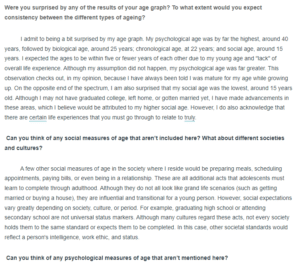Exploring Age – Biological, Social, and Psychological Factors in Health
Peer Response
This is a good post. Each type of age has something to say about them. For instance, biological, social, psychological, and chronological age differences can tell much about your general health. Having a higher psychological age than other ages can be linked to increased risks to health for several reasons. Being told that you were too “mature for my age” during your younger days meant that people used to view you as somebody who, despite your chronological age, acted more like someone who was an adult. The psychological age focuses on how one manages one’s emotions and rationality regarding situations in one’s life. Therefore, by having a high psychological age, you may have noticed that you may be less outgoing and have a limited social life. Concerning your low social age, in which social age focuses on your interacting with others and how you behave as per your chronological age, it means that you may have had fewer social interactions. Although the relationship between social life and health is complex, research on working from home and mental and physical health outcomes showed that people with fewer social interactions risked having pain, depression, and reduced quality of life, among other negative outcomes (Oakman et al., 2020). However, having a high psychological and low social age should not worry you, as research shows that engaging in team events can improve social, physical, and psychological health outcomes (Andersen et al., 2018). Regardless, as the determination of the biological age is based on evidently measurable biomarkers, many other factors should be considered in determining psychological and social ages, such as an individual’s overall view and take on life, their social status, and their lifestyle, among others, for more accuracy.
References
Andersen, M. H., Ottesen, L., & Thing, L. F. (2018). The social and psychological health outcomes of team sport participation in adults: An integrative review of research. Scandinavian Journal of Public Health, 47(8), 832–850. https://doi.org/10.1177/1403494818791405
Oakman, J., Kinsman, N., Stuckey, R., Graham, M., & Weale, V. (2020). A rapid review of mental and physical health effects of working at home: how do we optimise health? BMC Public Health, 20(1), 1–13. https://doi.org/10.1186/S12889-020-09875-Z/TABLES/5
ORDER A PLAGIARISM-FREE PAPER HERE
We’ll write everything from scratch
Question 

Exploring Age – Biological, Social, and Psychological Factors in Health
Were you surprised by any of the results of your age graph? To what extent would you expect consistency between the different types of ageing?
I admit to being a bit surprised by my age graph. My psychological age was by far the highest, around 40 years, followed by biological age, around 25 years; chronological age, at 22 years; and social age, around 15 years. I expected the ages to be within five or fewer years of each other due to my young age and “lack” of overall life experience. Although my assumption did not happen, my psychological age was far greater. This observation checks out, in my opinion, because I have always been told I was mature for my age while growing up. On the opposite end of the spectrum, I am also surprised that my social age was the lowest, around 15 years old. Although I may not have graduated college, left home, or gotten married yet, I have made advancements in these areas, which I believe would be attributed to my higher social age. However, I do also acknowledge that there are certain life experiences that you must go through to relate to truly.
Can you think of any social measures of age that aren’t included here? What about different societies and cultures?
A few other social measures of age in the society where I reside would be preparing meals, scheduling appointments, paying bills, or even being in a relationship. These are all additional acts that adolescents must learn to complete through adulthood. Although they do not all look like grand life scenarios (such as getting married or buying a house), they are influential and transitional for a young person. However, social expectations vary greatly depending on society, culture, or period. For example, graduating high school or attending secondary school are not universal status markers. Although many cultures regard these acts, not every society holds them to the same standard or expects them to be completed. In this case, other societal standards would reflect a person’s intelligence, work ethic, and status.
Can you think of any psychological measures of age that aren’t mentioned here?
I feel that psychological measures of age are very diverse and abundant and may be specific to each person. Some additional psychological factors of age may include trauma experienced, ability to deal with problems, self-worth, and overall mental health. These components are not black-and-white because they cannot be checked off a list. Psychological elements are more fluid and changing; for example, once you buy a house, you are a homeowner and can claim that through your social age. However, if you experience good mental health, you may have to work every day to maintain this positivity and avoid falling into negative mental health. Thus, the fluidity of psychological measures also depends on many secondary factors.